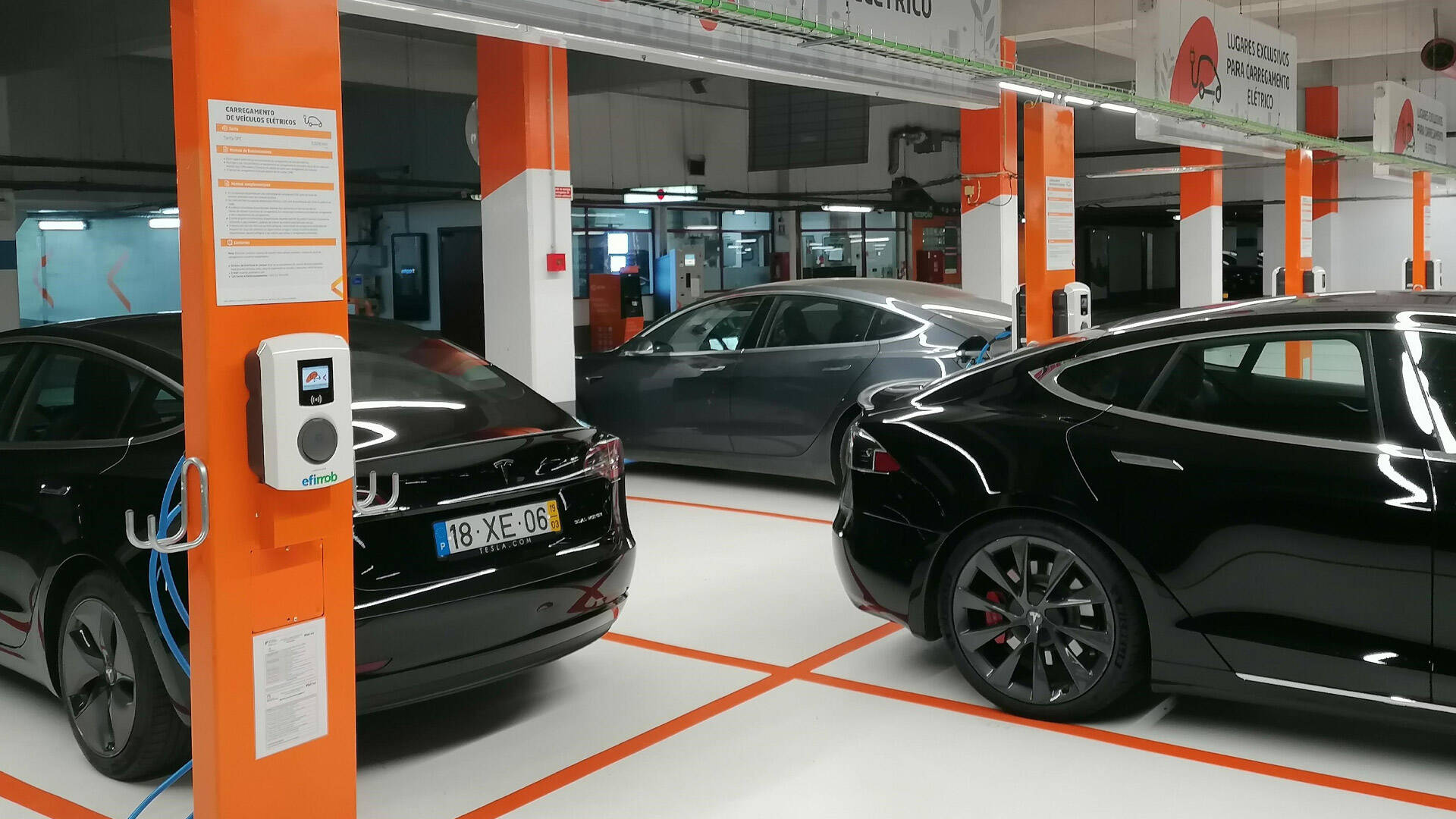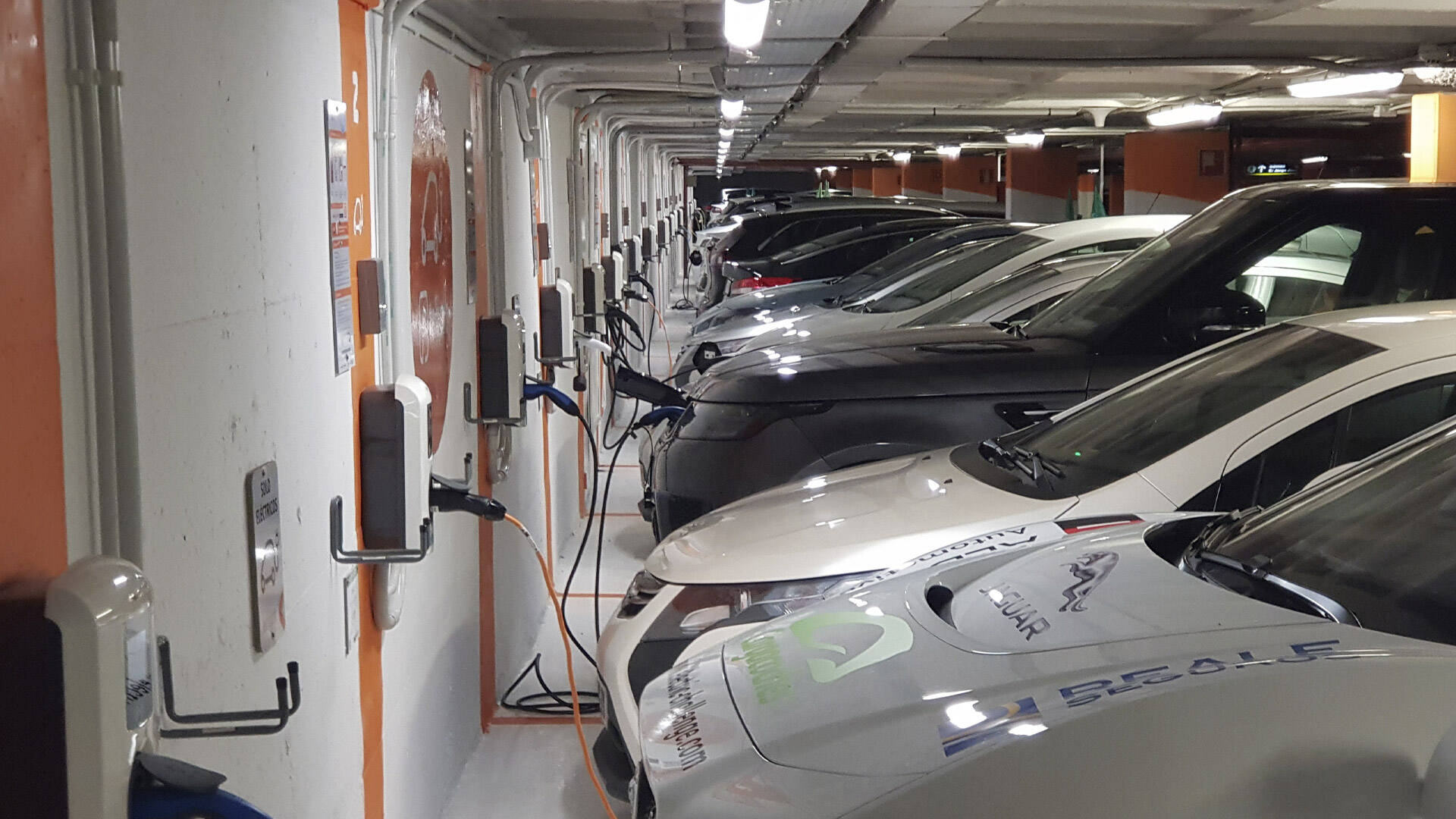
Efimob and Empark on planning ahead
for smart parking



Go to next article

Go back
scroll down

PR: Alfen has always led the technology and has the knowledge and experience. We have had lots of discussions in the past to help us make the right decisions and Alfen’s advice has always been right – and you need to get it right from the start or you could quite quickly be in a situation where you need to waste time and money replacing obsolete or inadequate charging technology.
MCR: You cannot just install a plug, you need it to be smart because things are only going to get more complicated.
PR: Because needs and therefore business models will need to change in the future, it was important to choose a partner and chargers that were flexible and could adapt accordingly.
Can you explain why you chose Alfen and how it adds value?
What will things look like in the future and what are the barriers to getting there?
MCR: I see car parks of the future being smart - with a combination of integrated solar generation, energy storage, and charging infrastructure that has load balancing to optimise energy and costs. Technology is key to this, to make it easy to manage effectively. We need to develop further commercial models that look at, for example, whether we use self-generated energy, sell it back to the grid or share it with nearby locations.
PR: Permissions are a problem. It can take a year to get permission in public locations. Off-street is much quicker.
From a technical perspective, the main problem is the available power, especially in city centres, where grids are saturated. Grid upgrades are very expensive and take time and so we need to plan ahead and look at smart alternatives. As an example, let’s say there are currently 8-10 chargers for 400 parking spaces. In future, this will need to be 100 chargers and the grid won’t accommodate this, so we need active load balancing solutions, to distribute available power across all vehicles charging at one time, while ensuring we stay within our kW connection agreement to avoid large
fines.
We already have an example of this in a car park in Madrid, where we started with 5 chargers, then 10, and now have 20 without having needed to increase our
grid connection contract. One of Alfen’s main selling points is its load balancing.
Can you tell us about the Iberian market?
MCR: The EV market is still quite small. At the end of 2019 only 0.2% of the 25 million passenger cars were electric and there is minimal public charging infrastructure. I recently took an electric taxi and the driver told me that there was only one fast charger in Madrid. There may be more but it is very limited.
PR: That’s correct. They are starting to roll out some along highways but not many. In an EV you really have to plan your trips at the moment and find private charging locations. Things are slowly gaining pace and they need to because it is estimated that we need an annual growth rate of at least 33% between now and 2030 to meet environmental targets.
MCR: Most people do not have parking at home they park in the street and off-street typically using concessions offered to residents by municipalities as part of their regulated parking schemes.
PR: There are also quite lot of car parks in apartment complexes but typically the car park owner just wants to make easy money for offering parking spaces. They have little interest in charging infrastructure and technology and so Empark really is doing things differently.
Also on-street parking is reducing as spaces are converted to sidewalks and cycle lanes and so the public does not like on-street spaces to be converted to EV as there are already too few. In some cities it is almost impossible to get local government approval to dedicate a public parking space to EV.
The Spanish government is not really pushing for on-street charging infrastructure it is letting the private side i.e. the parking companies develop it. Sometimes however there are hefty subsidies available ranging from 30% to 80% of the total cost of installing EV charging infrastructure.
MCR: I also think it is probably more expensive to install on-street as you have to disrupt the street perhaps close it for a while and so installation is easier in car parks.
PR: When e-mobility started 8 years ago there were so many rules that nobody would install chargers. You needed special permissions etc. but they have since deregulated to get the sector moving although they still need to do more. Also the utilities need to play their part by increasing grid capacity. It is sufficient right now but it will need to be ramped up because the market is gathering speed.
Can you please introduce yourselves and your companies?
MCR: Empark offers a range of parking solutions and we are always focused on how we can better serve customers so see ourselves more as a customer-centric retail organisation than an operator. That’s why we’re so focused on developing our Telpark App. It services over 2.3m account holders, delivering a range of parking and mobility products both on and off-street and, obviously, these include using Telpark for EV charging. We are also investing heavily in EV charging infrastructure and have deployed over 300 charge points (and this is still growing) that service over 4,000 customers each month in our off-street estate. Making things as simple and easy as possible for our customers is where Telpark comes in and Efimob has been a partner in that journey right from day one.
I joined Empark from a similar role at a large UK parking operator but have been here for a few years now. I am responsible for marketing which includes using data to optimise our products and business model for car parks – the data related to EV charging use helps me to do that. We are able to understand the differing needs of customers in different situations, for example, that want a quick top up, or are visiting a stadium, or are residential parking overnight.
PR: My history is in engineering and telecoms but I have been focused 100% on the e-mobility market now for 10 years. I really enjoy this industry, it’s more than a job, it is also a hobby and a way of life! It’s been a great growth journey, both personally and for Efimob. We will be looking at 40-50 full-time employees by the end of the year which is quite an achievement.
Efimob predominantly offers turn-key solutions; we do engineering, installation, back-office, and service & maintenance. We also develop load management
systems and mobile apps to optimise energy and ease
the customer experience so that customers such as Empark can easily manage their charging infrastructure. Our solution is integrated with Empark’s back-office to make it even more effective.
There are really two models for private infrastructure, you invest yourself or you let someone else invest and operate the chargers for you. The latter can lead to parking spaces with charge points that are inadequate and not integrated with other assets (i.e., payment and access systems). Moreover, the parking operator is not able to choose the customer tariffs for electricity used on their own premises which, in the medium term, is a competitive disadvantage. Empark is different, they have looked at the big, future picture and integrated it into their strategy.


An interview with Pedro Rodríguez, Managing Director at Efimob, & Maximilian Crane-Robinson, Marketing Director at Empark
Iberian car parking operator, Empark, is responsible for more than 419,000 parking spaces across 148 municipalities in Spain, Portugal, Andorra and Turkey. Formed as the result of a merger between key players in the Spanish and Portuguese markets, it is the largest operator on the Iberian Peninsula by revenues and number of car park spaces. It offers on-street and off-street parking, as well as off-street contract management.
Efimob is a charge point operator providing turnkey solutions, mostly in Iberia. It also sells its back-office software separately outside of Iberia, as well as developing load management systems and mobile apps which it white labels.
The two companies are working together to offer EV charge points across Empark’s off-street portfolio with a focus on ease of use from a customer perspective. We asked Efimob’s Managing Director, Pedro Rodriguez, and Empark’s Chief Commercial Officer, Maximillian Crane-Robinson, to tell us more about their relationship and the Iberian market in general.


Efimob and Empark on planning ahead
for smart parking



Go to next article

Go back
PR: Alfen has always led the technology and has the knowledge and experience. We have had lots of discussions in the past to help us make the right decisions and Alfen’s advice has always been right – and you need to get it right from the start or you could quite quickly be in a situation where you need to waste time and money replacing obsolete or inadequate charging technology.
MCR: You cannot just install a plug, you need it to be smart because things are only going to get more complicated.
PR: Because needs and therefore business models will need to change in the future, it was important to choose a partner and chargers that were flexible and could adapt accordingly.
Can you explain why you chose Alfen and how it adds value?
What will things look like in the future and what are the barriers to getting there?
MCR: I see car parks of the future being smart - with a combination of integrated solar generation, energy storage, and charging infrastructure that has load balancing to optimise energy and costs. Technology is key to this, to make it easy to manage effectively. We need to develop further commercial models that look at, for example, whether we use self-generated energy, sell it back to the grid or share it with nearby locations.
PR: Permissions are a problem. It can take a year to get permission in public locations. Off-street is much quicker.
From a technical perspective, the main problem is the available power, especially in city centres, where grids are saturated. Grid upgrades are very expensive and take time and so we need to plan ahead and look at smart alternatives. As an example, let’s say there are currently 8-10 chargers for 400 parking spaces. In future, this will need to be 100 chargers and the grid won’t accommodate this, so we need active load balancing solutions, to distribute available power across all vehicles charging at one time, while ensuring we stay within our kW connection agreement to avoid large
fines.
We already have an example of this in a car park in Madrid, where we started with 5 chargers, then 10, and now have 20 without having needed to increase our
grid connection contract. One of Alfen’s main selling points is its load balancing.

Can you tell us about the Iberian market?
MCR: The EV market is still quite small. At the end of 2019 only 0.2% of the 25 million passenger cars were electric and there is minimal public charging infrastructure. I recently took an electric taxi and the driver told me that there was only one fast charger in Madrid. There may be more but it is very limited.
PR: That’s correct. They are starting to roll out some along highways but not many. In an EV you really have to plan your trips at the moment and find private charging locations. Things are slowly gaining pace and they need to because it is estimated that we need an annual growth rate of at least 33% between now and 2030 to meet environmental targets.
MCR: Most people do not have parking at home they park in the street and off-street typically using concessions offered to residents by municipalities as part of their regulated parking schemes.
PR: There are also quite lot of car parks in apartment complexes but typically the car park owner just wants to make easy money for offering parking spaces. They have little interest in charging infrastructure and technology and so Empark really is doing things differently.
Also on-street parking is reducing as spaces are converted to sidewalks and cycle lanes and so the public does not like on-street spaces to be converted to EV as there are already too few. In some cities it is almost impossible to get local government approval to dedicate a public parking space to EV.
The Spanish government is not really pushing for on-street charging infrastructure it is letting the private side i.e. the parking companies develop it. Sometimes however there are hefty subsidies available ranging from 30% to 80% of the total cost of installing EV charging infrastructure.
MCR: I also think it is probably more expensive to install on-street as you have to disrupt the street perhaps close it for a while and so installation is easier in car parks.
PR: When e-mobility started 8 years ago there were so many rules that nobody would install chargers. You needed special permissions etc. but they have since deregulated to get the sector moving although they still need to do more. Also the utilities need to play their part by increasing grid capacity. It is sufficient right now but it will need to be ramped up because the market is gathering speed.
Can you please introduce yourselves and your companies?
MCR: Empark offers a range of parking solutions and we are always focused on how we can better serve customers so see ourselves more as a customer-centric retail organisation than an operator. That’s why we’re so focused on developing our Telpark App. It services over 2.3m account holders, delivering a range of parking and mobility products both on and off-street and, obviously, these include using Telpark for EV charging. We are also investing heavily in our EV charging infrastructure and have deployed over 300 charge points (and this is still growing) that service over 4,000 customers each month in our off-street estate. Making things as simple and easy as possible for our customers is where Telpark comes in and Efimob has been a partner in that journey right from day one.
I joined Empark from a similar role at a large UK parking operator but have been here for a few years now. I am responsible for marketing which includes using data to optimise our products and business model for car parks – the data related to EV charging use helps me to do that. We are able to understand the differing needs of customers in different situations, for example, that want a quick top up, or are visiting a stadium, or are residential parking overnight.
PR: My history is in engineering and telecoms, but I have been focused 100% on the e-mobility market now for 10 years. I really enjoy this industry, it’s more than a job, it is also a hobby and a way of life! It’s been a great growth journey, both personally and for Efimob. We will be looking at 40-50 full-time employees by the end of the year which is quite an achievement.
Efimob predominantly offers turn-key solutions; we do engineering, installation, back-office, and service & maintenance. We also develop load management
systems and mobile apps to optimise energy and ease the customer experience so that customers such as Empark can easily manage their charging infrastructure. Our solution is integrated with Empark’s back-office to make it even more effective.
There are really two models for private infrastructure, you invest yourself or you let someone else invest and operate the chargers for you. The latter can lead to parking spaces with charge points that are inadequate and not integrated with other assets (i.e., payment and access systems). Moreover, the parking operator is not able to choose the customer tariffs for electricity used on their own premises which, in the medium term a competitive disadvantage. Empark is different, they have looked at the big, future picture and integrated it into their strategy.


An interview with Pedro Rodríguez, Managing Director at Efimob, & Maximilian Crane-Robinson, Marketing Director at Empark
Iberian car parking operator, Empark, is responsible for more than 419,000 parking spaces across 148 municipalities in Spain, Portugal, Andorra and Turkey. Formed as the result of a merger between key players in the Spanish and Portuguese markets, it is the largest operator on the Iberian Peninsula by revenues and number of car park spaces. It offers on-street and off-street parking, as well as off-street contract management.
Efimob is a charge point operator providing turnkey solutions, mostly in Iberia. It also sells its back-office software separately outside of Iberia, as well as developing load management systems and mobile apps which it white labels.
The two companies are working together to offer EV charge points across Empark’s off-street portfolio with a focus on ease of use from a customer perspective. We asked Efimob’s Managing Director, Pedro Rodriguez, and Empark’s Chief Commercial Officer, Maximillian Crane-Robinson, to tell us more about their relationship and the Iberian market in general.





